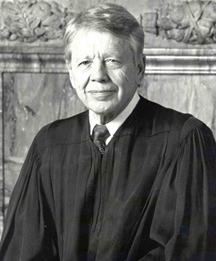James R. Browning

James Robert Browning (born October 1, 1918, Great Falls, Montana) is an American judge on the United States Court of Appeals for the Ninth Circuit. As of 2009, he has served 48 years on the court—the longest tenure in that court's history—and published over 1,000 appellate decisions. While Chief Judge of the Ninth Circuit, he oversaw numerous reforms that modernized and increased the efficiency of the circuit's administration.
Browning was raised in Belt, Montana, where he attended public school. He was nicknamed "Tiny" as a child, only growing to an adult height of 5'2". Browning received his undergraduate degree from Montana State University in 1938, and an LL.B. from Montana University Law School in 1941, where he graduated at the top of his class and served as editor-in-chief of the law review. After law school, he joined the Antitrust Division of the United States Department of Justice in Denver, Colorado. In 1943, he entered the United States Army as a private during World War II. He spent three years in the Pacific Theatre in military intelligence, and earned a Bronze Star and the rank of first lieutenant.
Browning left the army in 1946 and returned to the Department of Justice, where he proceeded to rise through the ranks over the following seven years. He served in the Washington, D.C. Antitrust Division office until 1948, when he moved to the Seattle office to serve as northwest regional chief. Browning came back to D.C. the following year to serve as assistant chief of the Antitrust Division's General Litigation Section, first assistant in the Civil Division from 1951-1952, and executive assistant to the U.S. Attorney General. In 1953, he organized and served as the first chief of the Executive Office for U.S. Attorneys (EOUSA).
He left the DOJ the same year, however, to enter private practice as a partner in the firm of Perlman, Lyons & Browning in D.C. He also lectured at New York University and Georgetown law schools. Browning then served as Clerk of the Supreme Court of the United States from 1958 until 1961 at the request of Chief Justice Earl Warren. Browning was the last clerk of the Supreme Court to hold the Bible at a presidential inauguration, for President John F. Kennedy.
On September 6, 1961, President Kennedy nominated Browning to the Ninth Circuit Court of Appeals, to a seat vacated by Walter Lyndon Pope. Despite receiving a "Not Qualified" rating from the American Bar Association and publicized opposition from sitting Supreme Court Justice Felix Frankfurter, Browning was confirmed by the United States Senate on September 14, 1961, and received his commission on September 18, 1961. Browning served as Chief Judge of the Ninth Circuit from 1976 until 1988. During that time he reorganized and modernized its administration so as to completely eliminate its backlog and reduce by half the time spent to decide an appeal. He also spearheaded such advances as the first fully computerized docket system in a federal court and the use of e-mail communications between judge's chambers. Browning assumed senior status on September 1, 2000.
In 1992, Browning was awarded the Edward J. Devitt Award for Distinguished Service to Justice, which is presented annually to a federal judge. In 2001, the Montana State Bar Association gave Browning its highest honor, the Jameson Award. In 2005, the main Ninth Circuit Court of Appeals courthouse in San Francisco was named in his honor.
Browning founded two non-profit institutions for the improvement of justice: the Western Regional Justice Center in Pasadena, California, and the Ninth Judicial Circuit Historical Society, also in Pasadena.
He is the last circuit judge remaining from the Kennedy Administration.
References
- James R. Browning at the Biographical Directory of Federal Judges, a publication of the Federal Judicial Center.
- Pelosi Introduces Legislation to Designate San Francisco Courthouse in Honor of James R. Browning, November 20, 2003 press release from the office of Congresswoman Nancy Pelosi.
- The State Bar's highest award goes this year to... Judge James Browning: Montana native, UM grad and now senior judge for 9th Circuit wins Jameson Award, The Montana Lawyer Magazine, August, 2001.
- Circuit Judge James R. Browning Take Senior Status, September 21, 2000 press release from the Ninth Circuit.
- Judges of the United States Court of Appeals for the Ninth Circuit
- United States court of appeals judges appointed by John F. Kennedy
- Washington, D.C. lawyers
- United States Army officers
- Montana State University alumni
- People from Great Falls, Montana
- 1918 births
- Living people
- Clerks of the Supreme Court of the United States
- University of Montana alumni
- New York University faculty
- Georgetown University faculty
